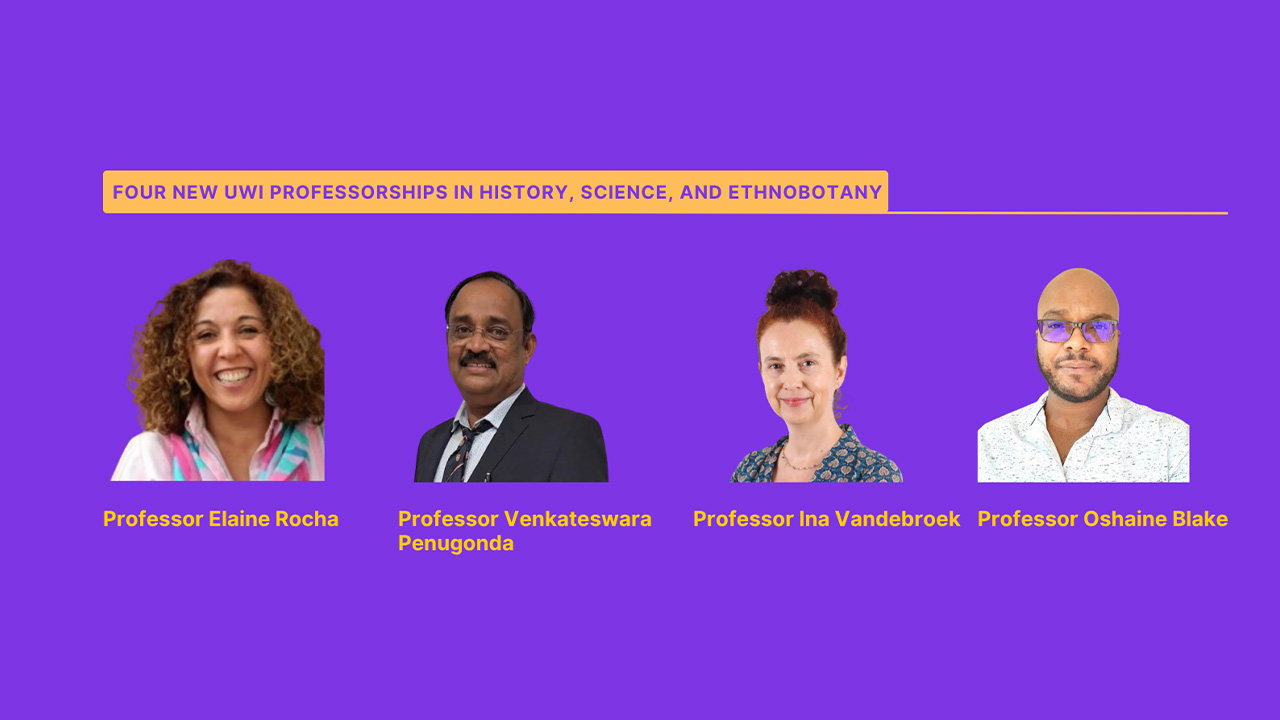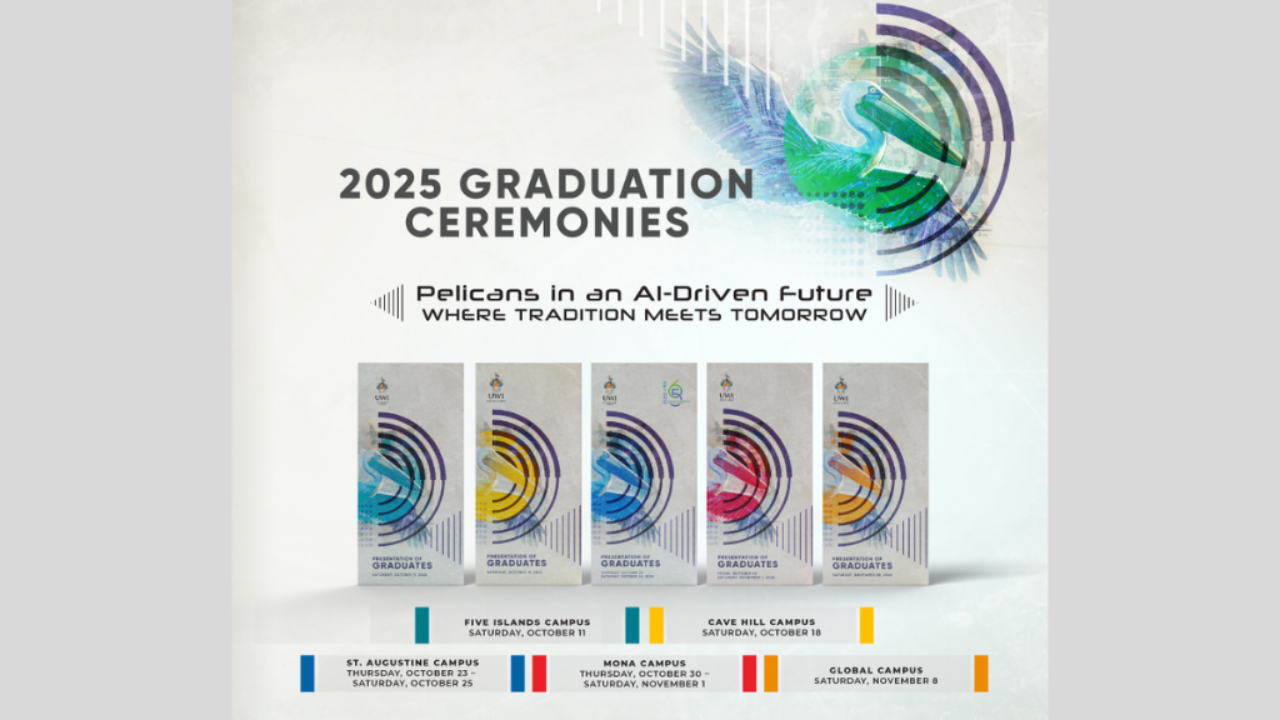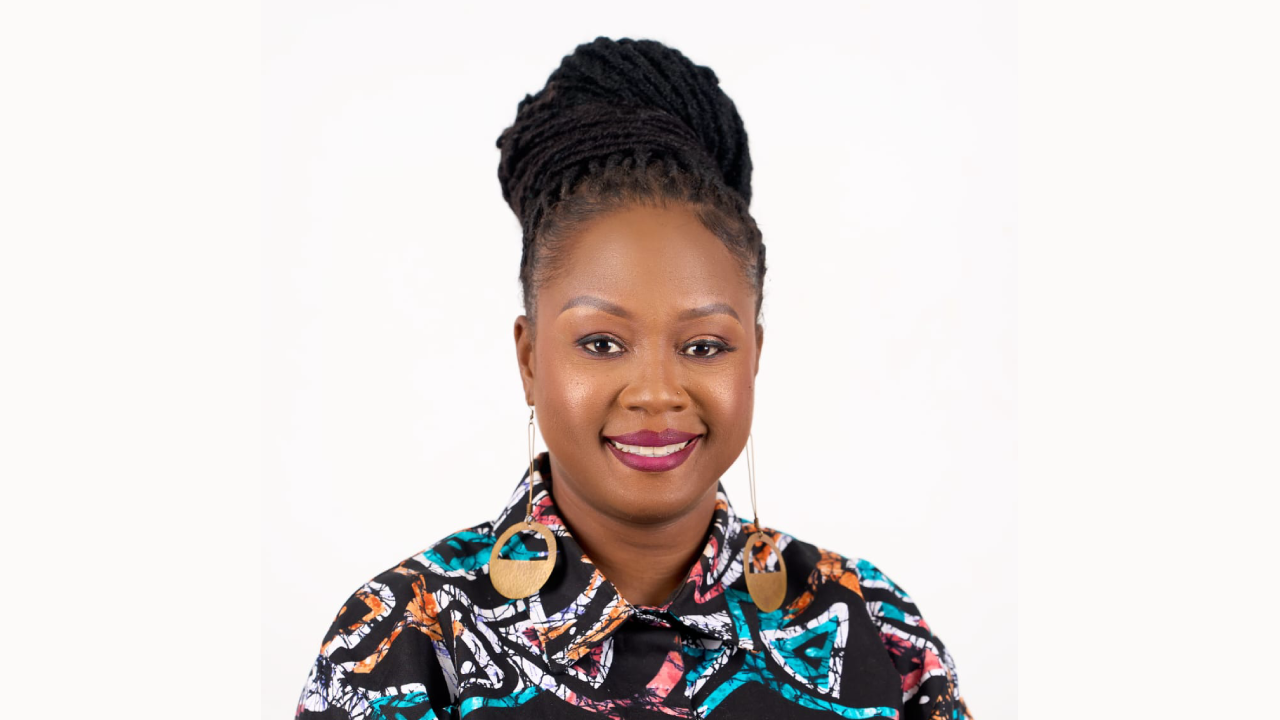
The University of the West Indies (The UWI) celebrates the promotion of four outstanding academics to the rank of Professor. They are internationally recognised experts in history related to Afro-descendant and Indigenous communities; glass science, bioglass and photoluminescent materials; geomechanics; and ethnobotany with a focus on medicinal and other culturally important plants in the Caribbean.
The four have earned the title of Professor, the institution’s highest academic rank, on the recommendations of internal and independent external assessors. Their assessments included a meticulous review of the quantity and quality of the candidates’ research, publications and other professional activities.
The new Professors are based at the Cave Hill, Mona, and St. Augustine Campuses. They are:
- Professor Elaine Rocha of the Cave Hill Campus was promoted to Professor of History
- Professor Venkateswara Penugonda of the Mona Campus, promoted to Professor of Glass Science
- Professor Ina Vandebroek of the Mona Campus, promoted to Professor of Ethnobotany
- Professor Oshaine Blake of the St. Augustine Campus was promoted to Professor of Geomechanics and Geophysics.
The professorial appointments became effective on May 28, 2025.
More about the Professors
Professor Elaine Rocha
Professor Elaine Rocha is a renowned historian who studies the interconnected histories of the African diaspora, especially regarding Afro-descendant and Indigenous communities in Brazil and the Atlantic world. Assessors have described her work as “important and innovative,” offering “pathbreaking contributions that span geographic regions and thematic areas.” One assessor remarked that “her most important scholarly contributions have evolved from her ability to compare the histories of South Africa, Ethiopia, Brazil, and the Caribbean,” with special recognition for her work on the history of women in these societies. Another observed that her scholarship “is interdisciplinary and diasporic,” engaging both historical and contemporary questions with rigour and originality.
Currently a lecturer in the Department of History and Philosophy at The University of the West Indies, Cave Hill, Professor Rocha holds a PhD in Social History from the Universidade de São Paulo (2002), an MPhil in Cultural History from the University of Pretoria (2008), and an MA in History from the Pontifícia Universidade Católica de São Paulo (1996). Throughout her career, she has taught at Addis Ababa University in Ethiopia, across several institutions in Brazil, and currently at The UWI. She was appointed Professora Destaque (Distinguished Lecturer) at the Universidade de Taubaté in Brazil and has held academic fellowships at the Pontifícia Universidade Católica de São Paulo and the Avery Research Centre for African American History and Culture at the College of Charleston, USA.
A committed educator and researcher, Professor Rocha has taught undergraduate and postgraduate courses, designed seven undergraduate courses, supervised seven graduate theses and examined six others. Her publication record includes three monographs, six edited collections, 29 book chapters, and 24 peer-reviewed journal articles, along with conference presentations and journalistic essays and articles. She has also delivered special lectures and presented at conferences across Brazil, Barbados, South Africa, the USA, the Dominican Republic, Canada, Colombia, Peru, Trinidad, the United Kingdom, the Netherlands, France, Portugal, and Mexico. Professor Rocha serves on the editorial board of Repecult: Revista de Ensaios e Pesquisas em Educação e Cultura and reviews for several academic journals. Her research has attracted funding for projects such as Rowing Against the Tide: Biography of an Afro-Brazilian Actor and Millie Gone to Brazil – Caribbean Immigrants in Brazil.
At The UWI, she served as Head of Department from 2015 to 2018 and has played a key role in curriculum development, student support initiatives, and academic governance. Her public service has included her roles as a member of the examining committee for the Caribbean Examinations Council’s (CXC) CSEC Portuguese and as Chair of the Barbados Museum and Historical Society (2017) Lecture Series “The Evolution of the Educational System in Barbados. From 2019 to 2022, she was Chair of the Ethnicity, Race and Indigenous Peoples (ERIP) Section of the Latin American Studies Association.
Professor Venkateswara Penugonda
Head of the Department of Physics at The University of the West Indies, Mona Campus and Professor of Glass Science, Venkateswara Penugonda, is a physicist whose research in glass science, photoluminescent materials, and bioactive glass has advanced both fundamental knowledge and applied innovation. He has over 30 years of experience in glass materials research and in teaching undergraduate and graduate-level physics courses. Assessors have praised his “innovative approach” to research, thorough investigation and careful presentation of highly reliable data. His work spans multiple engineering domains, with particular success in “Bioactive glass” for medical devices, rare-earth doped glass for photonics, and glass/glass ceramics for engineering applications.” He has developed several new types of optical glasses, including bioactive glass materials for tissue regeneration.
Professor Penugonda holds a Doctor of Philosophy, a Master of Philosophy and a Master of Science in Physics from Acharya Nagarjuna University in Andhra Pradesh, India. He plays an active role in science outreach, serving as faculty advisor to the UWI Mona Astronomical Club and advising physics teachers at Mona High School, Immaculate High School, and Knox College.
As a research supervisor, Professor Penugonda has guided five PhD candidates and three postgraduate researchers through completed research with eight PhD and two MPhil students currently under supervision. His publication record includes 64 peer-reviewed journal articles, 19 papers in the h-index, 36 in the i10-index with a total of 1128 citations, three book chapters, 11 refereed abstracts, and numerous conference presentations and invited lectures. He reviews for over 20 academic journals and has assessed more than 130 articles. He serves on the editorial boards of the Scientific Reports Nature Publications, Journal of Engineering Publication House and the Science Research Association (SEIREA) Journal of Materials, and was Guest Editor for a special issue of Frontiers in Dental Medicine on bioactive glass in tissue engineering.
His work is marked by strong international collaboration, with research partnerships spanning 18 institutions in the USA, UK, Russia, France, Poland, Portugal, Mexico, Turkey, Saudi Arabia, Switzerland, South Korea, Slovakia, Algeria, Tanzania, Malaysia, and India. He also holds two patents in industrial design.
Professor Penugonda’s contributions have been widely recognised. He received The UWI Vice-Chancellor’s Award for Excellence in Teaching (2020/2021) and several Mona Campus Principal’s Awards: Most Outstanding Researcher (2023, 2021, 2020, 2016), Best Research Publication (2017), and Research Project with the Greatest Multidisciplinary Collaboration (2020). He received a Research Fellowship Award from the Government of Slovakia in 2021 and 2018 and an Award for Outstanding Teaching from Arba Minch University, Ethiopia, where he was formerly a faculty member. For his outstanding contributions to peer reviewing, Professor Penugonda has earned multiple certificates from leading materials science journals.
Professor Ina Vandebroek
Professor Ina Vandebroek is a renowned ethnobotanist. Her work has significantly contributed to the preservation and respectful integration of Indigenous and ancestral knowledge systems into policy, education, and conservation practices. One assessor highlighted her ‘determined’ approach and noted her initiative in addressing local medical needs through plant applications.
Professor Vandebroek has published extensively, including four books and edited volumes, 12 book chapters, and 61 peer-reviewed journal articles. Her co-authored article, “Globalisation and Loss of Plant Knowledge: Challenging the Paradigm,” is considered ground-breaking by assessors. Her research on medicinal plants, particularly in the Caribbean, has enhanced understanding of traditional uses and promoted broader recognition of these practices. Assessors have remarked that her work encourages a “greater appreciation for and respectful inclusion of Caribbean traditional knowledge in research, education, and policy-making.” Additionally, her publications have raised awareness about the conservation of neglected African vegetables and other underutilised species of cultural importance.
Professor Vandebroek has contributed to the international policy document “A Global Program on Conservation of Useful Plants and Traditional Knowledge: A Call to Action,” which she co-signed alongside 15 scientists from ten countries. Her professional contributions extend to media articles, blogs, podcasts, and photography, with her work featured in National Geographic and showcased at the United Nations COP28.
She earned her PhD in Medical Sciences from Ghent University in Belgium and holds a Certificate in Plant Systematics of Neotropical Families from Utrecht University in the Netherlands. Before joining The University of the West Indies (UWI), she served as the Matthew Calbraith Perry Associate Curator of Economic Botany and Caribbean Program Director at the Institute of Economic Botany at The New York Botanical Garden. Her academic experience includes adjunct appointments at Yale School of the Environment, Columbia University, the City University of New York, the Missouri Botanical Garden, and the Universidad Mayor de San Simón in Bolivia. Since 2022, she has served as Editor-in-Chief of Economic Botany, the flagship peer-reviewed journal of the Society for Ethnobotany.
Professor Vandebroek’s research has attracted over US $1.4 million in grant funding. She has supervised three PhD candidates, ten MPhil candidates, and two Junior Mellon Fellows at the Institute of Economic Botany and the Humanities Institute in New York. At UWI, she serves as Graduate Coordinator for the MPhil/PhD programme in Ethnobotany and Ethnobiology. She has worked on the securing and safeguarding of plant collections at the Herbarium in the Department of Life Sciences.
Professor Vandebroek has received the UWI Mona Campus Principal’s Award for Best Research Publication for ‘Popular Medicinal Plants in Portland and Kingston, Jamaica’ and ‘Reshaping the future of Ethnobiology Research after the COVID-19 Pandemic’ (2023) and the Society for Economic Botany President’s Award on two occasions (2022, 2021). In 2020, she was selected to deliver the Kent-Kew Annual Distinguished Ethnobotanist Lecture.
Professor Oshaine Blake
Professor of Geomechanics and Geophysics at The UWI, St. Augustine Campus, Professor Blake’s research focuses on the physical properties of geological materials and geological phenomena such as mud volcanism. His research and laboratory innovation have advanced regional capacity in experimental rock physics and are critical to resource exploration, sustainable energy systems, and natural hazards. As one assessor noted, “the research of the type that Professor Blake does in the laboratory can be regarded as strategic for society… it not only serves the current oil industry but is also a key element in the energy transition, for instance, geothermal energy and Carbon Capture and Storage.”
Professor Blake earned his PhD in Earth Sciences from the University of Liverpool, where he conducted pioneering work on the effect of damage on the elastic properties of rocks and developed original experimental methods. His doctoral research was published in leading international journals and supported by two competitive awards from the UK Research Councils: the EPSRC Dorothy Hodgkin Postgraduate Award and the EPSRC PhD Plus Scheme. Today, he is a member of the American Geophysical Union, the American Association of Petroleum Geologists, and the Geological Society of Jamaica.
At The UWI, Professor Blake has led the development of critical laboratory infrastructure that supports both academic research and commercial applications. Between 2017 and 2019, he established the Thin-section Laboratory in Petroleum Geoscience within the Department of Chemical Engineering. Funded by the Trinidad and Tobago Ministry of Energy and Energy Industries to the value of TT$770,000, this facility houses advanced rock cutting, polishing, and preparation equipment used to analyse rock microstructures with high precision. He also led the creation of a Geomechanics and Rock Physics Laboratory, the only one of its kind in the Caribbean, Central and South America. With combined funding of over TT$3 million from the Petroleum Geoscience Unit, the Ministry, bpTT, the Department of Chemical Engineering and The UWI’s Campus Research and Publication Fund, this facility includes a unique triaxial apparatus, porosity-permeability testing systems, and a rock preparation workshop, all used for reservoir and geomechanical characterisation under in-situ conditions. These facilities are also positioned for future commercialisation, with expressed interest by industry partners.
Professor Blake’s scholarly output includes 27 peer-reviewed journal articles, three conference papers, and over 30 conference and invited presentations. He continually serves as an academic reviewer for 15 international journals, including Tectonophysics (Elsevier), Rock Mechanics and Rock Engineering, and Geomechanics and Engineering, an International Journal. He has supervised five PhD candidates, one MPhil and one MSc student. His ability to secure funding for both research and infrastructure has been commended for the significant “energy and leadership” demonstrated in an area of strategic importance for the region.



